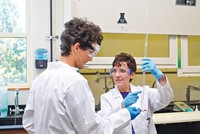Advertisement
Grab your lab coat. Let's get started
Welcome!
Welcome!
Create an account below to get 6 C&EN articles per month, receive newsletters and more - all free.
It seems this is your first time logging in online. Please enter the following information to continue.
As an ACS member you automatically get access to this site. All we need is few more details to create your reading experience.
Not you? Sign in with a different account.
Not you? Sign in with a different account.
ERROR 1
ERROR 1
ERROR 2
ERROR 2
ERROR 2
ERROR 2
ERROR 2
Password and Confirm password must match.
If you have an ACS member number, please enter it here so we can link this account to your membership. (optional)
ERROR 2
ACS values your privacy. By submitting your information, you are gaining access to C&EN and subscribing to our weekly newsletter. We use the information you provide to make your reading experience better, and we will never sell your data to third party members.
K-12 Education
Pop Quiz!
Match wits with the high school students who take the IChO exam
by Sophie L. Rovner
July 16, 2012
| A version of this story appeared in
Volume 90, Issue 29
The International Chemistry Olympiad (IChO) exam is no piece of cake, even for chemists who are considerably older than the high school students who take it.
“Graduate students might be able to answer most of the questions, but not all of them, and certainly not within the period of time that’s expected,” says Michael P. Doyle, chair of the chemistry and biochemistry department at the University of Maryland, College Park, which will host the olympiad on July 21–30. Even established scientists would find it hard to answer a number of the questions, he adds. But it’s not impossible; at last year’s IChO in Ankara, Turkey, a student from the Czech Republic earned a perfect score on the theoretical part of the exam. (The other part of the exam is a lab practical.)
Despite the challenge, chemistry olympians don’t seem to regard the experience as an ordeal. “It would destroy me,” Doyle admits, but “students come into this with a visible sign of relaxation and enthusiasm.”
They gain their confidence in part from intensive preparation ahead of IChO. That advance work includes practice with a large number of preparatory problems, says Doyle, who along with his departmental colleague Andrei N. Vedernikov chaired the 15-member volunteer committee that wrote this year’s preparatory and exam problems.
IChO guidelines specify the length of the exam as well as the topics that can be considered fair game for questions. Exam writers can also throw in a few questions from outside those areas as long as the topics are introduced in the preparatory questions.
The exam, which is translated by mentors from each of the student teams’ countries, is presented to the students in a paper booklet, with a second booklet in which they write their answers. Answers are numerical or structural to avoid errors in translation during grading.
The questions tend to be lengthy and have multiple parts. Here’s a sampling of some of the briefer questions from previous years’ exams.



To download a PDF of the full article and popquiz, visit http://cenm.ag/quiz.



Join the conversation
Contact the reporter
Submit a Letter to the Editor for publication
Engage with us on Twitter